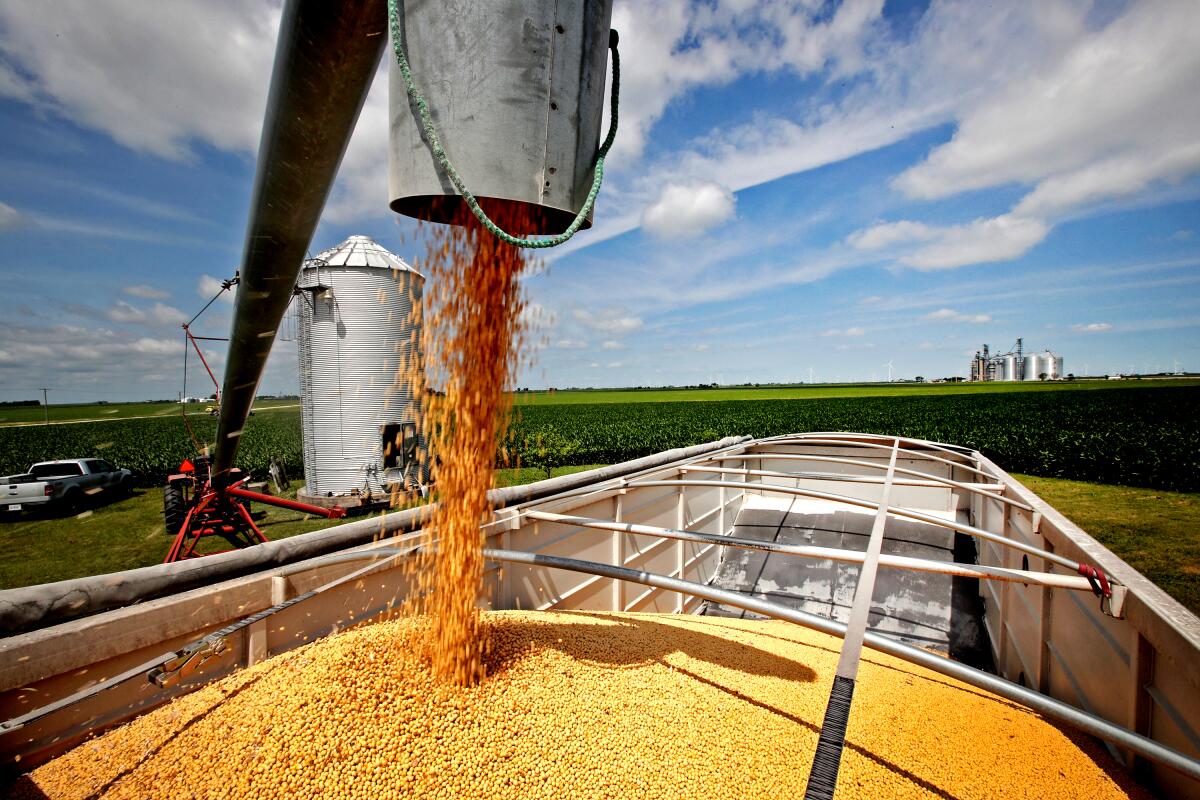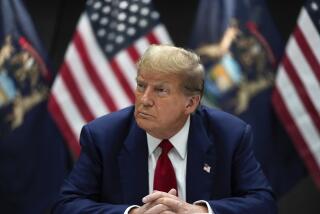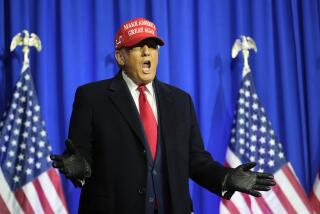Opinion: Like Bloomberg, Trump wants to buy the election. And he wants to use your money to do it

Some Democrats complain about billionaire former New York City Mayor Michael Bloomberg trying to buy the election, but at least he’s doing it with his own money.
President Trump is using yours.
Let’s break down that Friday morning tweet. Farmers are being “formally targeted” by foreign countries because Trump picked a trade war with the entire globe, first with tariffs on solar panels, then steel and aluminum imports, and then on an increasing number of Chinese goods. The predictable result was retaliatory tariffs and other sanctions against U.S. exporters; in China’s case, that included a freeze on purchases of many farm goods. Beyond that, the tariffs have held back investment and economic growth, both in the U.S. and globally.
The retaliation caused real damage to farmers, in the form of billions of dollars in lost revenue and a sharp rise in bankruptcies. Given how important agriculture-dependent red states are to Trump’s political base, the president couldn’t ignore the pain the tariffs were causing farmers. So in 2018, the administration extended $12 billion in additional subsidies to farmers as compensation for lost exports; last year, the pledge grew to $16 billion. In other words, Trump used tax dollars to attend to the wounds he opened with his trade policy.
Your tax dollars at work!
It’s worth noting here that the relief was not applied equally across the industry. Critics say it flowed disproportionately to the farmers who needed it least, and that it favored farms in the South over those in the northern plains states and the Midwest. At the request of Sen. Debbie Stabenow (D-Mich.), the Government Accountability Office is investigating whether the aid is being distributed to the right farmers and in the right amounts.
At any rate, the initial trade deal Trump struck with China calls for a vast increase in purchases of U.S. farm goods, which you could applaud as a good thing for farmers, or you could critique as a managed-trade payoff to a political constituency. Or both! But that deal will take months to bear fruit, hence Trump’s tweet Friday.
The administration hasn’t distributed the full $16 billion in promised aid, and Agriculture Secretary Sonny Perdue said in mid-January that the rest would be coming soon. That’s probably what Trump was referring to in his tweet. The new wrinkle, though, was Trump’s idea that the “massive tariff money coming into the USA” would cover the cost.
All of the revenue the feds collect is fungible, so sure — you might as well say that the tariffs being collected are paying for the farm aid. Heaven knows it’s enough money; according to calculations by the deregulatory-minded American Action Forum, the tariffs are costing almost $78 billion annually.
But Trump’s tweet is misleading in one way: It implies that tariffs are being paid by people outside the U.S. The money isn’t “coming into the USA,” it’s being paid by importers at the ports of entry. In other words, it’s coming into the USA from Los Angeles, Louisiana, Texas, Florida and anywhere else that imported goods arrive. And then those costs are passed on to the businesses and consumers buying those goods.
Some supporters of the tariffs contend that Americans aren’t really paying them. Instead, they say, they’re being absorbed by exporters in China and elsewhere who have been forced to lower their prices to remain competitive. Or they could be negated by changes in the foreign exchange rate.
But research has shown that tariffs are, in fact, raising prices of the affected goods in the U.S. That means businesses and consumers here are paying them.
So the next time you buy a smartphone, a toaster, a washing machine or most other types of products made in China, you’ll be helping U.S. farmers weather the blows inflicted by the trade war. At least, that’s President Trump’s version. And he should know; he started it.
More to Read
A cure for the common opinion
Get thought-provoking perspectives with our weekly newsletter.
You may occasionally receive promotional content from the Los Angeles Times.






